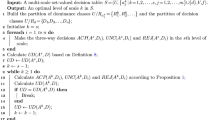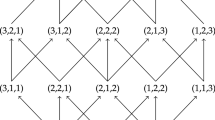Abstract
The optimal scale selection is the key problem in the study of multi-scale decision information systems. Dynamic change is one of the main features of big data, and the amount of information will often increase sharply with the passing of time. As is well known, the issue of updating the optimal scale of a multi-scale decision information system has been becoming a challenging problem in recent years, and it indeed has important theoretical and practical research values. Note that adding multiple objects can be viewed as adding one object multiple times. So, it just needs to clarify the change laws of optimal scale under the case of adding one object. Although the existing work has considered this problem in terms of the sufficient condition of updating the optimal scale, the results seem to be inaccurate. In other words, both sufficient and necessary conditions are still missing. In this paper, using sequential three-way decisions, the sufficient and necessary conditions of updating the optimal scale of a multi-scale decision information system are developed for the addition of an object, which makes the theoretical study on updating the optimal scale more complete.


Similar content being viewed by others
References
Chen YS, Li JJ, Huang JX (2019) Matrix method for the optimal scale selection of multi-scale information decision systems. Mathematics 290:3–17
Chen YL, Zhang QH, Wang GY, Hu BQ (2020) Optimal scale selection and attribute reduction in multi-scale decision tables based on three-way decision. Inform Sci 541:36–59
Hao C, Li JH, Min F, Liu WQ, Tsang ECC (2017) Optimal scale selection in dynamic multi-scale decision tables based on sequential three-way decisions. Inform Sci 415:213–232
Hu MJ, Yao YY (2019) Structured approximations as a basis for three-way decisions in rough set theory. Knowl Based Syst 165:92–109
Huang ZH, Li JJ (2021) Discernibility measures for fuzzy covering and their application. IEEE Trans Cybern. https://doi.org/10.1109/TCYB.2021.3054742
Huang ZH, Li JJ, Dai WZ, Lin RD (2019) Generalized multi-scale decision tables with multi-scale decision attributes. Int J Approx Reason 115:194–208
Huang QQ, Li TR, Huang YY (2020) Incremental three-way neighborhood approach for dynamic incomplete hybrid data. Inform Sci 541:98–122
Li F, Hu BQ (2017) A new approach of optimal scale selection to multi-scale decision tables. Inform Sci 381:193–208
Li F, Hu BQ (2017) Stepwise optimal scale selection for multi-scale decision tables via attribute significance. Knowl Based Syst 129:4–16
Li JH, Mei CL, Xu WH, Qian YH (2015) Concept learing via granular computing: a cognitive viewpoint. Inform Sci 298:447–467
Li JH, Huang CC, Qi JJ, Qian YH, Liu WQ (2017) Three way cognitive concept learing via multi-granularity. Inform Sci 378:244–263
Li WK, Li JJ, Huang JX, Dai WZ, Zhang XP (2021) A new rough set model based on multi-scale covering. Int J Mach Learn Cybern 12(1):243–256
Lin TY (1997) Granular computing: From rough sets and neighborhood systems to information granulation and computing with words. European Congress on Intelligent Techniques and Soft Computing. Aachen, Germany, pp 1602–1606
Luo C, Li TR, Chen H et al (2018) Incremental rough set approach for hierarchical multicriteria classification. Inform Sci 429:72–87
Luo C, Li TR, Huang YY, Fujita H (2019) Updating three-way decisions in incomplete multi-scale information systems. Inform Sci 476:274–289
Pedrycz W (2001) Granular computing: an emerging paradigm. Physica, Heidelberg
Qian YH, Liang JY, Yao YY, Dang CY (2010) MGRS: a multi-granulation rough set. Inform Sci 180(6):949–970
She YH, Qian YH, He XL, Wang JT, Qian T, Zheng WL (2021) On generalization reducts in multi-scale decision tables. Inform Sci 555:104–124
Tan AH, Shi SW, Wu WZ, Li JJ, Pedrycz W (2020) Granularity and entropy of intuitionistic fuzzy information and their applications. IEEE Trans Cybern. https://doi.org/10.1109/TCYB.2020.2973379
Wu WZ, Leung Y (2011) Theory and applications of granular labelled partitions in multi-scale decision tables. Inform Sci 181(18):3878–3897
Wu WZ, Qian YH, Li TJ, Gu SM (2017) On rule acquisition in incomplete multi-scale decision tables. Inform Sci 378:282–302
Xie JP, Yang MH, Li JH, Zheng Z (2018) Rule acquisition and optimal scale selection in multi-scale formal decision contexts and their applications to smart city. Fut Gen Comput Syst 83:564–581
Xu WH, Li WT (2016) Granular computing approach to two-way learning based on formal concept analysis in fuzzy datasets. IEEE Trans Cybern 46(2):366–379
Xu WH, Yu JH (2017) A novel approach to information fusion in multi-source datasets: a granular computing viewpoint. Inform Sci 378:410–423
Yang XB, Zhang YQ, Yang JY (2012) Local and global measurements of MGRS rules. Int J Comput Intell Syst 5(6):1010–1024
Yang L, Xu WH, Zhang XY, Sang BB (2020) Multi-granulation method for information fusion in multi-source decision information system. Int J Approx Reason 122:47–65
Yao YY, Deng XF (2011) Sequential three-way decisions with probabilistic rough sets. In: Proceedings of the 10th IEEE international conference on cognitive informatics and cognitive computing, Banff, Canada, pp 120–125
Yao YY (2001) Information granulation and rough set approximation. Int J Intell Syst 16:87–104
Zadeh LA (1997) Toward a theory of fuzzy information granulation and its centrality in human reasoning and fuzzy logic. Fuzzy Sets Syst 90:111–127
Zhang XQ, Zhang QH, Chen YL, Wang GY (2020) Optimal scale selection by integrating uncertainty and cost sensitive learning in multi-scale decision tables. Int J Mach Learn Cybern 11(5):1095–1114
Acknowledgements
This work was supported by the National Natural Science Foundation of China (Nos. 11701258, 11871259, 11971211).
Author information
Authors and Affiliations
Corresponding author
Additional information
Publisher's Note
Springer Nature remains neutral with regard to jurisdictional claims in published maps and institutional affiliations.
Rights and permissions
About this article
Cite this article
Chen, Y., Li, J., Li, J. et al. A further study on optimal scale selection in dynamic multi-scale decision information systems based on sequential three-way decisions. Int. J. Mach. Learn. & Cyber. 13, 1505–1515 (2022). https://doi.org/10.1007/s13042-021-01474-7
Received:
Accepted:
Published:
Issue Date:
DOI: https://doi.org/10.1007/s13042-021-01474-7




